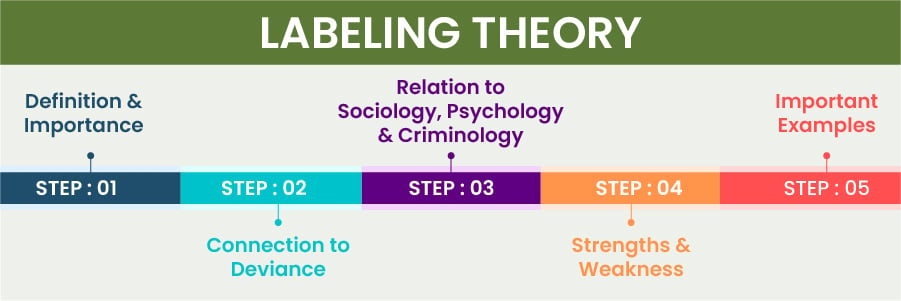Labeling Theory: Explore the Key Concepts & Elements
15 Nov 2024 1010 20 minutes
To understand you as a person, sometimes there are tags placed on your head to understand your personality. We often put ourselves in boxes to define who we are, whether it's a housewife, boss, or schoolboy. It is what we call labels. One of the most fundamental approaches to understanding crime and its basics is to understand what is labeling theory. It is an engaging theory for all those students who want to improve their knowledge in sociology, psychology, and criminology.
But, wait, do you know the basics of this theory? Experts at Global Assignment Help have come up with an informative blog that covers vital aspects of labeling theory sociology. From importance, connection with deviance, strengths, and weakness to examples, it covers everything. So, let's begin with finding the meaning of labeling theory.

Labeling Theory: Meaning & Importance
Once a famous thought said by Howard Beckar, “Deviancy is not a quality of the act a person commits, but rather a consequence of the application by others of rules and sanctions to an offender.” This theory justifies that the behavior pattern of individuals is influenced by how the community labels them. There are five stages to understanding what is labeling theory:
- In the first stage, people believe that individuals with mental illness will be discriminated against by other members of society.
- People with mental illness are labeled by the treatment agencies where they find the hope of getting a cure.
- In the third stage, patients, due to circumstances, react to the labeling secretly.
- The negative influence of society finally leads the person to the result of labeling.
- The final stage is where future deviance is developed through labeling.
Thus, the labeling theory sociology suggests that no person is inherently deviant in an act, which means no action is criminal until the outcome is delivered. So, to know more about the labeling theory of deviance, read the next section.
Get Labeling Theory HelpWhat Is the Labeling Theory of Deviance?
What is labeling theory in deviance? This approach proves that any individual is not inherently deviant in a particular act. It is developed by society's reaction to a particular act. Whatever you label a person, he will be bound to act like that. But what is the connection between labeling and deviance?
It is the process of considering a manner unacceptable in society, and based on that, members react to the label. Labeling theory criminology encourages deviant behavior in three ways:
Deviant Self-Concept
The self-concept states that when a person is labeled as criminal or deviant by society, they experience stereotypes from others. It also explains that we often see ourselves based on how society sees us. Thus, the person labeled deviant is given the stereotype reactions that shape their self-concept.
Social Exclusion
Based on the label provided to criminals, they often start getting excluded from social events, non-deviant persons, and various opportunities. But if the person tries to change the label of society by avoiding interactions with normal people and improving their skills alone, can get higher paying jobs. Thus, there is always a positive and negative effect of labeling theory criminology, yet it depends on how the deviant person takes it.
Deviant Groups
Now, if the deviant person gets little or zero support from conventional or legitimate societies, they try to get involved in deviant groups. Under this level, they feel secure as here all the deviant people are accepted without any stereotypes. However, involvement in these groups can increase the risk of criminal behaviors and be a vital risk factor for society.
All such deviant behaviors encouraged by labeling are now clear with this theory. Thus, it is evident how such behavior is influenced by society. But what is the relation of labeling with different subjects? Let’s explore this in the coming section.
Labeling Theory of Sociology, Psychology & Criminology
Labeling theory in sociology, psychology, and criminology indicates that if you are labeled someone as a crime, that person is most likely to act upon it. It is because that person feels discriminated against by the world, and that can affect his mind, which leads to becoming a criminal. Now, for better learning, let’s understand the importance of this theory in different areas.
What Is Labeling Theory in Sociology
It states that how society labels the individual, the person will consider himself as someone society labeled him. Their lives and behaviors are handled by how the community thinks. Thus, here, the sociologist uses this theory to comprehend the minds of another person to understand the circumstances.
What Is Labeling Theory in Psychology
Labeling theory plays a crucial role in finding the relationship between society's influences and individuals' perceptions. It helps to study how culture labels or tags a person, directly reflecting on their behavior change. When psychologists apply this approach, it helps them to understand how titles influence self-identity and confidence.
What Is Labeling Theory in Criminology
What makes some people criminal or deviant, or what are the acts? The logic behind this theory is that after committing an act, the individual becomes punishable by society. Even when they are accepted by society, they will be labeled, as “crazy”, “not normal”, or “criminal”. Thus, labeling theory criminology definition helps criminologists to understand the individual's actions and reactions to particular events.
Thus, this theory about sociology, psychology, and criminology works with the process of,
|
Label ➡ Behavior ➡ Proof Confirming the Label Engraved |
Moreover, if you ever work on an AP research paper and face issues finding relevant topics, you can also read our AP research topics blog for reference. Moving on, our experts have come up with the strengths and weaknesses of labeling theory so that you get a clear idea of how to apply it in life.
You May Also Like to Read: Literary Theory| Learn Its Definition and Types
Strengths & Weakness of Labeling Theory
Imagine a person with a clear background has been assumed a criminal due to society's label, so would you like to find the reason? We are sure everyone would like to understand why society is putting labels. So, this can be better cleared with the strengths and weaknesses of labeling theory psychology.
Strengths
Looking for the strengths of labeling theory can help you or any other person move in the right direction. It enables one to highlight the positive labels on self. So, explore them in depth.
Helps in Making Suitable Predictions
It is the most common issue of many individuals that they adapt to unknowing situations and label them as deviant. Now, when the person becomes the culprit, he/she cannot vote in any other state and cannot be a part of a jury. Being labeled also restricts him from applying for a job, and he gets reported. Thus, with the knowledge of labeling theory deviance, you start understanding whom to label and whom to consider as guilty.
Better Understanding of Deviant Behavior
When you start understanding labeling theory psychology it helps to provide a better knowledge of deviant Behaviors and actions. So that before you make any prediction, you know the purpose behind the action. Thus, it helps to structure society stronger than before.
Cultural Construction of Deviance
For better opportunities, the world has accepted the system of migration, where people shift places from one place to another. Now labeling theory psychology definition has been extremely helpful in understanding that if an individual is considered deviant in one state, then it is not necessary to consider the person the same in another state.
Better Context for Individuals with Disabilities
When an individual is fighting with any mental illness or any kind of disability, sometimes, society labels them as ill rather than understanding the context behind it. Thus, this theory helps promote the individuals struggling with any disability rather than being labeled.
Weakness
There are certain weak spots in the labeling theory, so let's find out.
Lack of Empirical Proof
In the 1960s and 70s, the labeling theory deviance gained popularity. But, nowadays, its concept is reduced due to a lack of scientific proof for labeled deviant.
Does Not Justify Deviance Etiology
No doubt that label theory explains how people serve a particular kind of deviant behavior. Yet, still, a question arises in mind about how such deviant behavior is caused in the first place.
Ignores the Positive Effect Of Labeling
The labeling perspective promotes negative effects more than positive ones. It focuses on giving a victim status to the criminal rather than finding the reason behind their cause.
These are some important strengths and weaknesses of labeling theory. Moreover, if you ever receive an assignment to write, then you can buy assignment from our experts. Moving on, we have provided examples of this theory for better reference. You can also read about self-fulfilling prophecy for a better understanding of this theory.
Important Labeling Theory Examples
Understanding the labeling theory positive examples at the right point of time can be helpful in grasping the simplicity and complexity of labeling theory. In this field, there are several real examples you might have noticed, but now that we use it here you will make better connectivity with theory. So without further ado, let’s explore the labeling theory examples in real life.
Example 1: Same-Sex Marriage: An Effective Theory
Aamir and Ian were two males in love with each other and wanted to get married. Now, the situation is, if they were living in Massachusetts, where same-sex marriage is legal in that state. The community of that state would have supported their marriage. Moreover, if they were living in Barbados, where same-sex marriage is illegal, they would be imprisoned for life. Further, the community would have labeled them as deviant.
Example 2: Troublesome Student: A Behavior Impact
In a class of students, the teachers have labeled one student as troublesome. Sometimes, he develops unnecessary disturbance and encourages disruptive behaviors. Now, all this is happening because, from the start, he has been labeled as a troubling maker, which makes him deviant to act upon the expectations.
According to these examples of the labeling theory, whatever title society will put on another person, he or she will act upon it. Thus, we hope the above example is helpful to clear your confusion on how labeling theory affects individuals at different levels of life. Yet, if you are still facing any doubts, contact our experts.
Get Labeling Theory Assistance from Us
If you are still confused about what is a labeling theory and its importance, get help from our services. At Global Assignment Help, we have a team of qualified experts ready to assist you in removing your doubts about labeling theory. It is necessary to comprehend this theory to find the relation between various social issues and highlight its responses.
Moreover, we make sure to resolve all queries and deliver excellent work without any spelling or grammar errors by using a grammar checker tool. Our professionals are available 24*7 for your assistance so that you do not struggle for longer periods. You will not regret trusting our services. So contact us now, and get the best assistance for your label theory.
Frequently Asked Questions:
1. How Does Labeling Theory Explain Deviance?
Labeling theory explains deviance in such a way that how society labels the other person, they are made to act in a certain negative way because of society’s label. Whatever opinion a community has on another person, they become deviant in their perceptions. Moreover, this theory proves that no behavior is developed on its own, but it's deviant because of society's reaction.
2. Who Created the Labeling Theory?
The labeling theory was invented by Howard Beckar in the 1960s, and it is considered one of the most important pieces of publishing. Through this theory, a question became famous in criminology, what makes certain people act or become deviant or criminal? There are certain acts that are labeled as criminal and how deviance or crime is constructed through it.
3. How Can Labeling Affect a Person?
Labeling can create wrong expectations for different people and develop a particular mindset. For example, if a person is from Asia, and it is considered that Asian math is good, someone can expect that person to be excellent in math. Yet, in opposite, it can lead to stereotypes that create unrealistic or less expectations from people even if they are capable.
4. What Is an Example of Labelling in Real Life?
If a person is completing his duty at night, he might be seen as a hard-working person. But, if a person is considered a thief who moves around at night, he will be labeled as a thief who might steal something. This is an understanding pattern, no one is entirely good or bad, and it is their personality and actions that describe their traits. Thus, this is the labeling theory sociology example.
Free Tools

Paraphrasing Checker Tool
Easy to Use Paraphrasing Tool to Simplify Complex Academic Writing
Check Now
Dissertation Outline Generator
Get Structured Outline by Professionals for Your Dissertation
Check Now
Referencing Tool
Effortlessly manage citations and references with our smart referencing tool
Check NowLowest Price Guarantee
Get A+ Within Your Budget!Price Calculator
Offers & Benefits
Get upto 56% OFF on Your First Order !
Offers Benefits
Other Services
Latest Blogs

- 17 Apr 2025
- 4436 Views

- 20 Mar 2025
- 712 Views

- 04 Mar 2025
- 524 Views

- 28 Feb 2025
- 623 Views



















Thank you for submitting your comment on this blog. It is under approval. We will carefully review your submission and post it on the website.